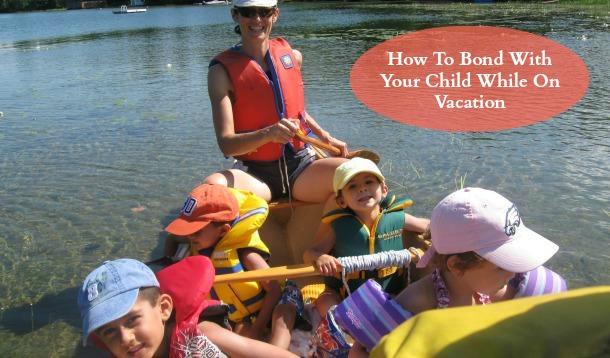
A family vacation is an excellent and important time to improve the connection with your children. Use the time away to solidify the secure attachment your child has with you, and repair any relationship rifts that may have occurred.
I use our trips away as a chance to really understand what my kids love, don’t love, are afraid of, or dream about. I also use them to get to the bottom of behaviour that is a bit off. With my therapist hat on, I gently dig to understand what might be bothering my kids and spend time working on skills like calm-down plans and speaking up for themselves.
I find all these can be done when we spend a good chunk of the day in an outdoor excursion. When we’re hiking, biking, or canoeing together, it seems the usual pressures are lifted. I find a natural setting helps encourage vulnerability while distracting us enough with awesome surprises.
We can have fun and be real at the same time.
Here are five ways to tune in and reconnect with your child while on your next vacation:
Identify a few activity options available to your kids, and then let them pick the one they like. For example, our family is going to Clevelands House Resort in Muskoka on Lake Rosseau, ON this summer. They have boat rentals there so we’ll ask our kids what type of water activity they would like to do: kayaking, canoeing, or water skiing. If they want to do more than one, they can choose which day to do each of those. This is also a good time to show them how to plan based on weather forecasts!

We picked a driving trip this summer, partly to keep the costs down by not flying, but also to see the countryside around us. You can get out paper maps or use your computer search engine to plan driving routes and places to stop.
Wherever you go or however you get there, plan out what your “out the door” times are and what you need to take with you.
Do some fun math (I used to be a math teacher!) by calculating how long it will take to get where you are going based on your average speed and the distance left to drive. D=RT (Distance = Rate x Time)
You can also talk about budgeting in an age-appropriate way—what is the best way to get everyone fed: Eating out? Making meals in your room? What is the total amount you hope to spend on your vacation? How are you going to spend that?
(I'm going to take full advantage of the restaurant at Clevelands House and put my energy into my kids; not making meals!)
When children are involved in trip planning and this kind of higher-level decision-making, they feel closer to you.
A child will feel very special when you make an effort to spend time with just him or her. When you have this time together, pick an activity you both like to do and make sure to use that time as an opportunity to really see your child. Don’t criticize or constantly correct her—have fun goofing around.
Pre-teens and teens tend to open up better when they aren’t face-to-face with adults. As you are hiking together, canoeing or tossing a ball around, ask questions about how things are going in her world. Make sure not to judge what she says! Be open and interested in what she shares.
If you are staying at a place like Clevelands House that has kid’s programs, camps, and a playground, you can take each child for some one-on-one time with you while the other one(s) get taken care of by the staff!
Try asking your child this, “You know, I really want to do better. What is one thing you’d like me to fix? How can I be a better Mom (or Dad)?”
It’s okay if your child shrugs and says, “I don’t know.” See if you can get somewhere by asking about things you think might not be going well. For example, “So we kind of get on each other’s nerves about video game playing—what do you think we can do to stop that? How can you still play games a bit but not so much you make it hard for us to hang out?”
If you have a parenting goal you’d like to change, if your child is old enough to understand, perhaps share that goal. Many parents I work with are trying to yell less and calm down before doing things they regret—perhaps share how you are taking action to change your behaviour along this line. Ask your child how he or she can help you to attain your goals (by paying attention when you speak/making calm-down plans).
It is actually possible to be on a trip with your children and not fill their attachment tanks at all. Don’t just be in the same space; pay attention to what your child is experiencing—what makes him happy, sad, or angry? What is going well in his life and what are his challenges? Find a way to communicate that he matters to you.
A good question to ask yourself to determine if your time together is helpful is this:
How does my child feel about himself as a result of spending time with me?

This is proudly sponsored by our friends at Clevelands House.
www.clevelandshouse.com